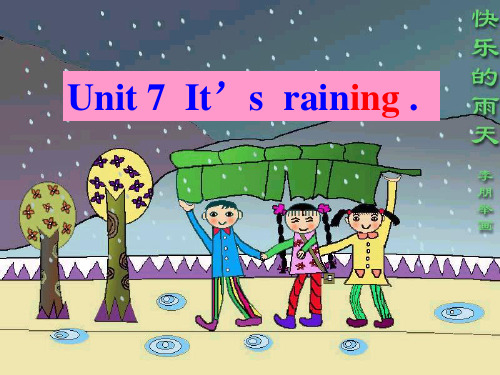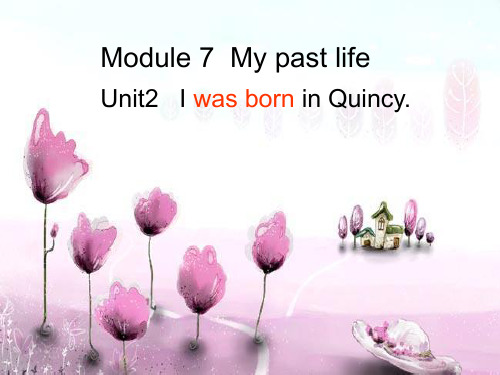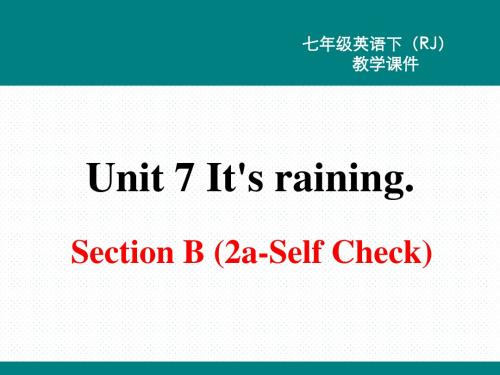七年级下册英语第七单元课件.ppt
合集下载
Unit 7--8 课件人教新目标七年级英语下册单元基础知识复习

Ⅱ.电话常用语
1. 我是…… (speaking).
This is…
2. 你是……吗? Is that … (speaking)?
3. 是的,我就是。 Yes,speaking.
4. 请问您是谁? speaking?
Who is that
5. 我可以和……讲话吗? May I speak to …?
They’re playing basketball in the park.
He’s studying at his friend’s home.
Great!/ Not bad./ Terrible!
语法探究
Ⅰ.有关天气的表达: 询问天气的句型: How's the weather? =
What's the weather like? 常见天气的描述: 1. 晴朗: It's sunny./The sun is shining brightly. 2. 阴天: It's cloudy. 3. 刮风: It's windy./The wind is blowing. 4. 下雨: It's raining/rainy. 5. 下雪: It's snowing/snowy.
短语运用 用方框中, right now, call back, on vacation, write to, have a good time, sound like, play computer games
1.—Can you help me do the dishes, Marie? —Sure, I'll do it ___ri_g_h_t_n_o_w___. 2.Helen, please ___c_a_l_l _b_a_c_k__your teacher. He wants to know something about your Chinese. 3.The weather is nice. Bill's family are __o_n_v_a_c_a_t_i_o_n_ in Hainan.
牛津深圳版英语七年级下册Unit7Poems知识点梳理课件

— That’s a good idea.
2.It’s an important meeting. DDono’n’t be (not, be) late for it.
3. HHowow
wonderful the film is!
4. LLooookk (look) out! There are many cars on the road.
(well 好地 adv. well adj. 健康的)
12.shower:washing the body by standing under running water 淋
浴 n.
Unit 7 Poems
13.narrow:small Unit 7 Poems
Unit 7 Poems Unit 7 Poems
from
one
side
to
the
other,
not
wide
狭窄的
adj.
Unit 7 Poems
Unit 7 Poems
(narrowly Unit 7 Poems
Unit 7 Poems
狭窄地,勉强地
adv.)
Unit 7 Poems
Unit 7 Poems
14.height:distance from the base to the top 高度 n. (high 高的
他读书和看报为了知道今天有什么新鲜事。
3.Then I see him working, on the building site. 然后我看到他在建筑工地上工作。
4.He’s walking on a narrow piece of wood, not worried about the height, not afraid, not afraid like me. 他正走在一根狭窄的木头上,不担心高度,不害怕,不像我一 样害怕。
2.It’s an important meeting. DDono’n’t be (not, be) late for it.
3. HHowow
wonderful the film is!
4. LLooookk (look) out! There are many cars on the road.
(well 好地 adv. well adj. 健康的)
12.shower:washing the body by standing under running water 淋
浴 n.
Unit 7 Poems
13.narrow:small Unit 7 Poems
Unit 7 Poems Unit 7 Poems
from
one
side
to
the
other,
not
wide
狭窄的
adj.
Unit 7 Poems
Unit 7 Poems
(narrowly Unit 7 Poems
Unit 7 Poems
狭窄地,勉强地
adv.)
Unit 7 Poems
Unit 7 Poems
14.height:distance from the base to the top 高度 n. (high 高的
他读书和看报为了知道今天有什么新鲜事。
3.Then I see him working, on the building site. 然后我看到他在建筑工地上工作。
4.He’s walking on a narrow piece of wood, not worried about the height, not afraid, not afraid like me. 他正走在一根狭窄的木头上,不担心高度,不害怕,不像我一 样害怕。
(完整版)七年级下册英语unit7It's raining全单元课件(含知识点))

be play study talk do make
➢根据上下文的问句和答语来确定空格处 的意思, 特别是每个空格后面的词汇。 ➢ 根据上下文的时态及时间状语来确定句 子的时态。如: right now 为现在进行时 态的时间状语。而 usually,every Saturday 及 every day 是一般现在时态 的时间状语。
Unit 7 It’s raining .
It's windy.
It's sunny.
It's cloudy.
It's rainy. It's raining.
It's snowy. It's snowing.
描述天气的形容词常见的如下表:
名词
含义
形容词 含义
sun
太阳
sunny 晴朗的
—Could I go out now, mom?妈妈我现在可以出去吗? —Sure. (当然可以。)/
I’m sorry, but you have to finish your homework first. (抱歉,你得先做完你的作业。)
9
Fill in the blanks:
1.北京的天气怎样?天气晴朗。 __H_o_w__’__s ___th__e__ _w__e_a_th_e_r__in Beijing?
2c Talk about the people with a partner.
Uncle Joe Aunt Sally
Mary
J
Jeff
--What’s Uncle Joe doing? --He is playing basketball.
(This is/ It's) Rick: Hello, Rick speaking. Rick speaking.
➢根据上下文的问句和答语来确定空格处 的意思, 特别是每个空格后面的词汇。 ➢ 根据上下文的时态及时间状语来确定句 子的时态。如: right now 为现在进行时 态的时间状语。而 usually,every Saturday 及 every day 是一般现在时态 的时间状语。
Unit 7 It’s raining .
It's windy.
It's sunny.
It's cloudy.
It's rainy. It's raining.
It's snowy. It's snowing.
描述天气的形容词常见的如下表:
名词
含义
形容词 含义
sun
太阳
sunny 晴朗的
—Could I go out now, mom?妈妈我现在可以出去吗? —Sure. (当然可以。)/
I’m sorry, but you have to finish your homework first. (抱歉,你得先做完你的作业。)
9
Fill in the blanks:
1.北京的天气怎样?天气晴朗。 __H_o_w__’__s ___th__e__ _w__e_a_th_e_r__in Beijing?
2c Talk about the people with a partner.
Uncle Joe Aunt Sally
Mary
J
Jeff
--What’s Uncle Joe doing? --He is playing basketball.
(This is/ It's) Rick: Hello, Rick speaking. Rick speaking.
Unit+1+Section+B+3a-Self+ch课件2022-2023学年人教版英语七年级下册

A. join B. to join C. joins D.join to
4. Mary can play the chess____C___ she can't swim.
A. and B. or
C. but
D. so
5. His brother plays ______D_ piano every day.
1. 我能说英语。 I can s_p_e_a_k___ Engilsh. 2. 你能帮助小孩们游泳吗?C_a_n__ you_h_e_l_p kids w_i_t_h_ swimming? 3.汤姆会弹吉他,但是他不会弹钢琴。 Tom can play the guitar but he can’t play the piano.
A.in B.with C.at D.on
按要求写出下列单词或短语 1.说英语__s_p_e_a_k___E_n_g_l_ish
2.弹吉他____p_l_ay__t_h_e__g_uitar 3.跟...交谈____t_a_l_k__to____ 4.下象棋____p_l_a_y__ch_e_s_s__
4.你善长说英语吗? Are you good at speaking English?
5.Tom 不会唱歌又不会跳舞。 Tom can't sing or dance. 6. David can sing.David can’t sing well. (合并成一个句子)
3b Make a poster. Ask for help with an event at your school.
You can use: sports players(运动员) school sports day(学校体育活动日)
外研版七年级英语下册《Module7 Unit2》优质课课件(共33张PPT)

living room somewhere you relax at home
bathroom somewhere you wash your body.
work in pairs
- where were you born? - I was born in… - Who was your first teacher? - My first teacher was… - What was she/he like? - She/He was strict(friendly,kind…)
Who are they?
John Adams and his son John Quincy Adams
3.When was Betty there for the last time?
In 2020.
Time to read! 多层阅读 二读:分段阅读课文 ①读第一段完成下题
1. How old is Betty King? 12/twelve.
Time to read!
③读第四、五段完成下题 1. 找出短语“回去,回到”go__b_a__c_k___ 和“期待,期望”lo_o_k__fo__rw__a_r_d__to____
2. It was great_t_o__p_la_y__(play) there. 该句的主语是:_t_o_p_l_ay__th_e_r_e______.
Time to talk!
The house today
is There be
are
The old houses
There be
was were
Match the key words with each paragraph.
Module7 Unit2 课件外研版英语七年级下册

式主语,不定式短语to do sth.为句子真正的主语,意为“做某事 是……的”。 e.g. It was difficult to finish the work.
做完这项工作是很难的。
知识讲解
5. One day I’ll back, and I’m looking forward to seeing my friends again. 总有一天我会回去,我期待与我的朋友再见面。
知识讲解
1. There were lots of things to do in Quincy... 在昆西有很多事情可做…… 此句为there be句型的过去时。there be句型的过去时为There was / were ...,
否定句是在was或were后加not,一般疑问句是将was或were提到句首。 e.g. There was a boy here just now.
2 Read Para. 1. Fill in the chart.
The things to do in Quincy
There were lots of things to do, with (1)__m_a_n_y__st_o_r_e_s__, two movie theaters, football clubs and basketball teams.
→There wasn’t a boy here just now. →— Was there a boy here just now?
—Yes, there was./ No, there wasn’t.
知识讲解
【拓展】 there be 句型的时态
一般现在时态
一般过去时态
there is
there was
做完这项工作是很难的。
知识讲解
5. One day I’ll back, and I’m looking forward to seeing my friends again. 总有一天我会回去,我期待与我的朋友再见面。
知识讲解
1. There were lots of things to do in Quincy... 在昆西有很多事情可做…… 此句为there be句型的过去时。there be句型的过去时为There was / were ...,
否定句是在was或were后加not,一般疑问句是将was或were提到句首。 e.g. There was a boy here just now.
2 Read Para. 1. Fill in the chart.
The things to do in Quincy
There were lots of things to do, with (1)__m_a_n_y__st_o_r_e_s__, two movie theaters, football clubs and basketball teams.
→There wasn’t a boy here just now. →— Was there a boy here just now?
—Yes, there was./ No, there wasn’t.
知识讲解
【拓展】 there be 句型的时态
一般现在时态
一般过去时态
there is
there was
最新部编RJ人教版 初一七年级英语 下册第二学期春 名师优课公开课堂教学课件 Unit 7 Section B 第二课时

3. Are they having a good time? _Y_e_s,_t_h_e_y__a_re_._____________________
4. How’s the weather there? _It_’_s_c_o_o_l_a_n_d__cl_o_u_d_.________________
5. How’s the weather in Jane’s country? _It_’_s_h_o_t_. _________________________
2c Fill in the chart with information
from the postcard in 2b.
Name Where How’s the are they? weather?
Do you live near your school? 你家住在学校附近吗?
三、studying hard 努力学习 hard 是副词;意为“努力地”,修
饰 动词。
Mary is a good student. She works hard at school.玛丽是名好学生,她 在学校里努力学习。
33cc Write a postcard to a friend. Tell your friend about your vacation
and what you are doing.
Dear …, How’s it going? My family and I are on a vacation. It’s …(季节) in ... (地名或国 名). The weather is …People are having fun. They are... I am … My father is …My mother is…We’re having a good time. I miss you. ...
冀教版七年级下册英语Unit 2 It's Show Time! Lesson 7 授课课件

知识点 7 Let’sgotothelibraryandworkonourproj ects.
考点7 workon继续工作;不断工作;致力于;从事于 eg: Tomworkedonintheofficeuntilteno’clocklastnight. 汤姆昨晚在办公室工作到十点。
eg:Studentsenjoytalkingaboutfamousstars. 学生们喜欢谈论著名的明星。
Ioftentalkwithmyfriendonthephone. 我经常和朋友打电话交谈。
Iwanttotalkwithyouaboutourproject. 我想和你谈谈我们的课题。
典例 —Let’s___A___ourplanforthecomingholidays, shallwe?
考向 用于肯定句中
somewhere 到某处;在某处
用于肯定句中
anywhere 任何地方;无论何处 用于否定句或疑问句中
nowhere 哪里都不
本身具有否定含义
everywhere 到处;处处
用于肯定句中
eg:Iwanttogosomewherewarm. 我想去温暖的地方。 Didyoufindanywhererelaxing? 你找到令人放松的地方了吗? Duringthewinterholiday, Iwentnowhere, andjuststayedathome. 寒假期间,我哪里都没去,仅仅呆在了家里。 Hefollowsmeeverywhere. 他到处跟着我。 拓展 Timeismoney, butmoneycannotbuytime.
TheGreatWall TheGreatWallisinBeijing. Itisabout6,300kilometreslong.
- 1、下载文档前请自行甄别文档内容的完整性,平台不提供额外的编辑、内容补充、找答案等附加服务。
- 2、"仅部分预览"的文档,不可在线预览部分如存在完整性等问题,可反馈申请退款(可完整预览的文档不适用该条件!)。
- 3、如文档侵犯您的权益,请联系客服反馈,我们会尽快为您处理(人工客服工作时间:9:00-18:30)。
(公寓). The apartment is on__2__floor of a tall building (建筑物). __3__14 floors and a car park in the basement (地下室). My father parks (停放) his __4__there.
Unit 7 It’s raining! Unit 8 Is there a ;post office near here? Unit 9 What does he look like?
Unit 7┃ 能力提升训练
┃能力提升训练┃
Ⅰ. 补全对话,每空一词 A:1._W__h_e_r_e_are you from? B:I am from England. A:What's the weather 2.___li_k_e___in England? B:It's very nice now. The weather is never too
3.___h_o_t ___or too cold. A:Oh, it's very nice. But in China it's often too cold
in winter and it's too hot in 4.__s_u__m_m__e_r__. B:Yes, I like winter in China because I can skate (滑
结构: 一般疑问句+ or + 选择部分?如: Is he tall or short? 他个子高还是矮?
英语·
Unit 9┃ 语法探究
回答: 选择疑问句的回答不同于一般疑问句,不能用yes/no 来回答,而必须选择选项进行回答。如: —Does he live in Beijing or Shanghai?
他住在北京还是上海? —Beijing.北京。 Ⅲ. 进行时态表将来
在英语中,表示计划、安排好的事情,可以使用进行时态 表示将来要发生的动作;表示位移的动词(如:go, come, fly, leave, arrive等)的进行时态也可以表示将来。如:
英语·
Unit 9┃ 语法探究
We are meeting at seven tonight. 我们今晚七点见面。 He is leaving for Beijing tomorrow. 他明天要前往北京。 Ⅳ. 部分否定
Our apartment isn't in the center__5__the city. It's 3 km__6__the center. My father works in the city, __7__he goes to work__8__ every morning. He doesn't drive (驾驶) his car. He uses (用) his car only at __9__. Then he __10__us to the country or to the beach (海滩).
冰)on real ice in winter. A:But I like summer. I can swim in 5.__s_w_i_m_m__in__g__pools
in summer.
英语·
Unit 8┃ 能力提升训练
┃能力提升训练┃
Ⅰ. 完形填空 My name is Daisy. I_t
在英语中not和all, both, always, every在同一个句子 中表示“部分否定”,即: 否定一部分而不是否定整体。 如:
Not everybody likes soccer. 不是每个人都喜欢足球。
英语·
Unit 9┃ 能力提升训练
┃能力提升训练┃
Ⅰ.从方框中选择适当的选项补全对话(其中有一项多余) A: Don't you love Johnny Dean, Danny? B: Johnny …? A: Dean. The pop singer. B: I don't know. 1. _D___ A: He's really tall and really thin. 2. __F__ And he has long curly hair. Look, there he is. B: Oh, yeah, I see him. A: Hey, 3. _A___
英语·
英语·
Unit 9┃ 语法探究
注解1: “限定词”包括: 冠词、物主代词、指示代词 和数词,它位于各类形容词前。它本身分为三位,即: 前、 中、后。前位限定词有all、half、both、分数和倍数;中 位限定词有冠词、指示代词、物主代词等;后位限定词有基 数词和序数词,但序数词位于基数词前。如: both my hands; all his income.
注解2: “描绘”性形容词。如: beautiful、bad、 cold、great等。
英语·
Unit 9┃ 语法探究
注解3: “大、长、高”表示大小、长短、高低等一些词; 表示“形状”的词。如: round、square等;“国籍”表示一 个国家或地区的词。表示“材料”的词。如: wooden, woolen, stone,silk等;表示“作用类别”的词。如: medical, college,writing desk,police car等。 Ⅱ. 选择疑问句
Unit 7 It’s raining! Unit 8 Is there a ;post office near here? Unit 9 What does he look like?
Unit 7┃ 能力提升训练
┃能力提升训练┃
Ⅰ. 补全对话,每空一词 A:1._W__h_e_r_e_are you from? B:I am from England. A:What's the weather 2.___li_k_e___in England? B:It's very nice now. The weather is never too
3.___h_o_t ___or too cold. A:Oh, it's very nice. But in China it's often too cold
in winter and it's too hot in 4.__s_u__m_m__e_r__. B:Yes, I like winter in China because I can skate (滑
结构: 一般疑问句+ or + 选择部分?如: Is he tall or short? 他个子高还是矮?
英语·
Unit 9┃ 语法探究
回答: 选择疑问句的回答不同于一般疑问句,不能用yes/no 来回答,而必须选择选项进行回答。如: —Does he live in Beijing or Shanghai?
他住在北京还是上海? —Beijing.北京。 Ⅲ. 进行时态表将来
在英语中,表示计划、安排好的事情,可以使用进行时态 表示将来要发生的动作;表示位移的动词(如:go, come, fly, leave, arrive等)的进行时态也可以表示将来。如:
英语·
Unit 9┃ 语法探究
We are meeting at seven tonight. 我们今晚七点见面。 He is leaving for Beijing tomorrow. 他明天要前往北京。 Ⅳ. 部分否定
Our apartment isn't in the center__5__the city. It's 3 km__6__the center. My father works in the city, __7__he goes to work__8__ every morning. He doesn't drive (驾驶) his car. He uses (用) his car only at __9__. Then he __10__us to the country or to the beach (海滩).
冰)on real ice in winter. A:But I like summer. I can swim in 5.__s_w_i_m_m__in__g__pools
in summer.
英语·
Unit 8┃ 能力提升训练
┃能力提升训练┃
Ⅰ. 完形填空 My name is Daisy. I_t
在英语中not和all, both, always, every在同一个句子 中表示“部分否定”,即: 否定一部分而不是否定整体。 如:
Not everybody likes soccer. 不是每个人都喜欢足球。
英语·
Unit 9┃ 能力提升训练
┃能力提升训练┃
Ⅰ.从方框中选择适当的选项补全对话(其中有一项多余) A: Don't you love Johnny Dean, Danny? B: Johnny …? A: Dean. The pop singer. B: I don't know. 1. _D___ A: He's really tall and really thin. 2. __F__ And he has long curly hair. Look, there he is. B: Oh, yeah, I see him. A: Hey, 3. _A___
英语·
英语·
Unit 9┃ 语法探究
注解1: “限定词”包括: 冠词、物主代词、指示代词 和数词,它位于各类形容词前。它本身分为三位,即: 前、 中、后。前位限定词有all、half、both、分数和倍数;中 位限定词有冠词、指示代词、物主代词等;后位限定词有基 数词和序数词,但序数词位于基数词前。如: both my hands; all his income.
注解2: “描绘”性形容词。如: beautiful、bad、 cold、great等。
英语·
Unit 9┃ 语法探究
注解3: “大、长、高”表示大小、长短、高低等一些词; 表示“形状”的词。如: round、square等;“国籍”表示一 个国家或地区的词。表示“材料”的词。如: wooden, woolen, stone,silk等;表示“作用类别”的词。如: medical, college,writing desk,police car等。 Ⅱ. 选择疑问句
